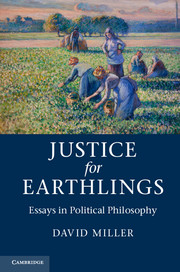Book contents
- Frontmatter
- Contents
- Acknowledgements
- Introduction
- 1 Political philosophy for Earthlings
- 2 Two ways to think about justice
- 3 Social justice in multicultural societies
- 4 Liberalism, equal opportunities and cultural commitments
- 5 Equality of opportunity and the family
- 6 Justice and boundaries
- 7 Social justice versus global justice?
- 8 ‘Are they my poor?’: the problem of altruism in a world of strangers
- 9 Taking up the slack? Responsibility and justice in situations of partial compliance
- 10 A tale of two cities; or, political philosophy as lamentation
- Index
- References
4 - Liberalism, equal opportunities and cultural commitments
Published online by Cambridge University Press: 05 February 2013
- Frontmatter
- Contents
- Acknowledgements
- Introduction
- 1 Political philosophy for Earthlings
- 2 Two ways to think about justice
- 3 Social justice in multicultural societies
- 4 Liberalism, equal opportunities and cultural commitments
- 5 Equality of opportunity and the family
- 6 Justice and boundaries
- 7 Social justice versus global justice?
- 8 ‘Are they my poor?’: the problem of altruism in a world of strangers
- 9 Taking up the slack? Responsibility and justice in situations of partial compliance
- 10 A tale of two cities; or, political philosophy as lamentation
- Index
- References
Summary
The principle of equality of opportunity stands at the very heart of contemporary liberalism. A liberal society must, among other things, be one that gives each of its members an equal chance to get what they want out of life. But that loosely formulated claim conceals a host of ambiguities and difficulties that come bubbling to the surface when we ask, as Brian Barry does in Culture and Equality, what equality of opportunity should mean in a multicultural society. I shall begin by setting cultural questions temporarily aside in an attempt to pin down the meaning, or meanings, of the principle itself. Then I shall ask how cultural commitments can be brought into the picture.
Equality of opportunity is often used in political debate in a relatively narrow sense to refer to access to positions of advantage. Given that there are scarce goods such as well-paid careers and places at top universities – scarce in the sense that more people want to have these goods than there are goods to go round – equality of opportunity obtains when people can compete for these goods on equal terms. That implies that access to the goods in question depends only on relevant features of individuals such as talent and effort, and not on circumstantial features such as coming from a wealthy family or attending a particular type of school. There is of course continuing debate about where this line should be drawn – on what should count as a relevant feature determining access and what should count as an irrelevant circumstance. But the underlying image is of a fair race in which all the runners compete on equal terms, so that at the end the prizes go to those who are simply the fastest.
- Type
- Chapter
- Information
- Justice for EarthlingsEssays in Political Philosophy, pp. 93 - 114Publisher: Cambridge University PressPrint publication year: 2013
References
- 1
- Cited by



